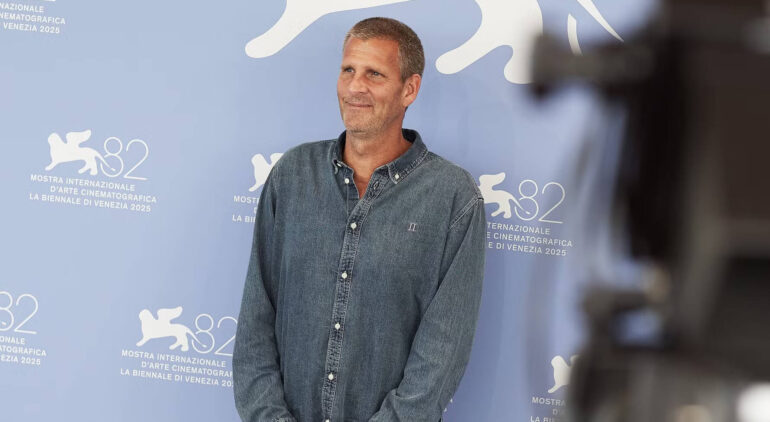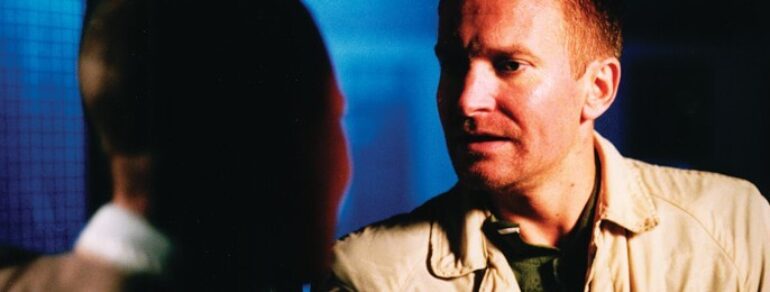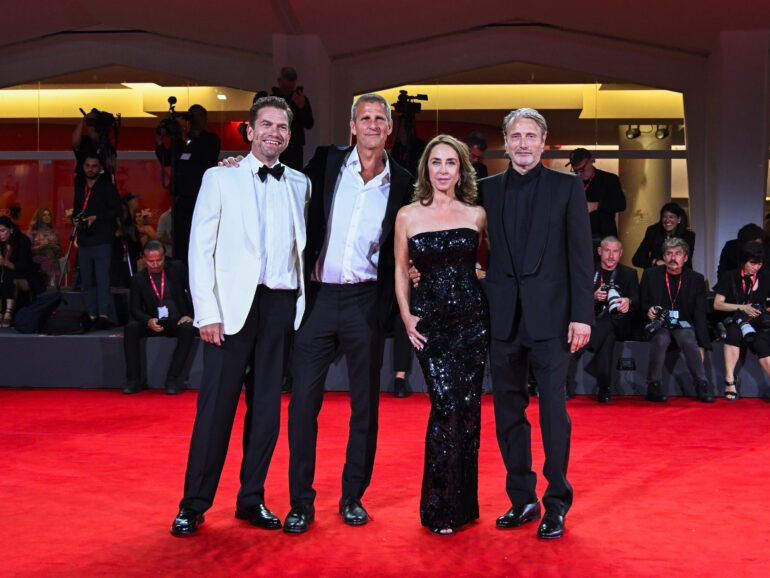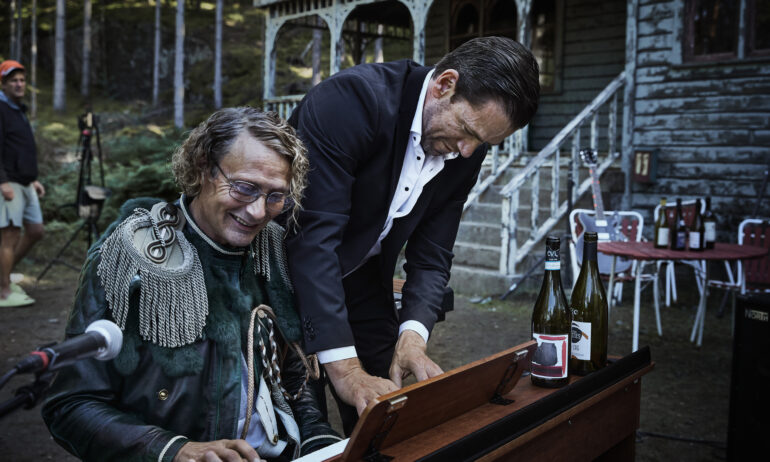Written by: Jan Lumholdt
04.09.25
Four active decades, 60 credits, six box office-topping features, scripts for Oscar-winning films, an Oscar of his own, and a lifetime achievement award. Is this Danish cinema dynamo finally ready to conquer the world?
The birth of the modern Danish cinema is usually dated as 1993, when a little horror-thriller called The Nightwatch(Nattevagten) met a national audience that included the younger filmgoers who up until then couldn’t quite identify themselves in the tidy and somewhat stuffy output at the time. The success proved far from a mere flash in the pan; Pusher (1996), The Celebration (Festen, 1998), and Italian for Beginners (Italiensk for begyndere, 2001) were all part of setting off a wave that would soon roll out into the world. Nicolas Winding Refn, Thomas Vinterberg, Lone Scherfigand Susanne Bier all got their breakthroughs, and would in several instances go on to win Oscars. Today, these names constitute the tip of a wondrous and fruitful mountain, brimming with luminaries, covering most genres and styles over the last four decades. To name a few: Søren Kragh-Jacobsen, Ole Bornedal, Kristian Levring, Per Fly, Niels Arden Oplev, Ole Christian Madsen, Annette K. Olesen, Nikolaj Arcel, Gustav Möller, Christoffer Boe, Martin Zandvliet, Tobias Lindholm, and Lars von Trier, the forerunner. They’ve all graced the A-list world arenas, been celebrated, and occasionally caused scandals, at times simultaneously.
One immensely fruitful filmmaker remains a curiously well-kept secret on an international level. His brief schooling period making shorts in the late 1990s quite instantly got him an Oscar, for Election Night (Valgaften, 1999). Six features have since then seen the light of day, all of them regularly topping the Danish box office. The Danish critics have greatly and warmly praised his darkly humorous tales of often despicable characters doing despicable deeds, all designed to get the viewers to actually warm to them. A regular stock company of the most stellar kind has certainly helped; Nikolaj Lie Kaas, Mads Mikkelsen, Ulrich Thomsen, Sofie Gråbøl, Bodil Jørgensen, Lars Brygmann, Søren Malling, and Nicolas Bro are all recurrently on board, several going all the way back to his feature debut Flickering Lights (Blinkende lygter, 2000), a film in every way as instrumental as Pusher or The Celebration in defining the modern Danish cinema wave. In Denmark, at least, if little or not at all elsewhere.
“It’s partly my own fault,” admits Anders Thomas Jensen in regard to this relative anonymity. “I’ve repeatedly referred to myself as a scriptwriter.”
And with good reason. Mifune (Mifunes sidste sang, 1999), The King is Alive (2000), Open Hearts (Elsker dig for evigt, 2002), Wilbur Wants to Kill Himself (Wilbur begår selvmord, 2003), After the Wedding (Efter brylluppet, 2006), In a Better World (Hævnen, 2010), Daniel (Ser du månen, Daniel, 2019), and The Promised Land (Bastarden, 2023) are all scripted by him. Most have premiered at Cannes, Berlin, Venice, San Sebastián or Toronto. Many have been awarded, some have been Oscar-nominated, and a few have won, as was the case with In a Better World in 2011 and before that The New Tenants (2009), a Danish-American short directed by Joachim Back. The National Danish Film Critics’ Awards even presented him with an honorary Bodil, the lifetime achievement recognition for his work in scriptwriting, at the 2003(!) ceremony.
“This thing with my directing really started when I’d written something no one else wanted to make, so I had to do it myself. These days, nothing could be further from the truth.”
Flickering Lights, The Green Butchers (De grønne slagtere, 2003), Adam’s Apples (Adams æbler, 2005), Men and Chicken (Mænd og høns, 2015) and Riders of Justice (Retfærdighedens ryttere, 2020) constitute his output. Each have sold around 500,000 tickets in Danish cinemas, while Berlin, Cannes and the other festivals have abstained from any invitations – despite Mikkelsen’s leading presence in all of them.
“We have an ongoing joke in our little gang, which is that I’m the only Danish director who makes films with Mads Mikkelsen who won’t get Oscar-nominated. Am I a festival director? I’d say no. But there’s obviously something in this new one, some kind of serious tone that’s seeped through, that has struck a note in Venice.”
Like his Nordic colleagues Roy Andersson and Aki Kaurismäki – and increasingly, Dag Johan Haugerud – Anders Thomas Jensen has that director’s signature that will identify him within a minute of screentime and is evident in The Last Viking from the opening shot. We meet Anker (Nikolaj Lie Kaas), a hardened criminal about to serve some 15 years in prison due to money transport theft bringing in some 40 million DKK, out of which 20 million thankfully (to Anker) are hidden before the arrest. Given the responsibility of hiding this loot is Anker’s brother Manfred (Mads Mikkelsen), whose peculiar personality well “on the spectrum” includes a deep affinity with Vikings and lately also John Lennon, whose name and identity he has taken, very seriously at that (he’ll even jump out of any window if someone calls him Manfred). The money trail brings the two brothers to their one-time childhood home, welcomed as Airbnb guests by dysfunctional couple Margrethe (Sofie Gråbøl) and Werner (Søren Malling). Lots of trouble await them. An overly violent goon from the robbery, Friendly Flemming (Nicolas Bro), turns up and needs more cash, actually all of it, “or things will get out of hand”. Manfred/John won’t/can’t divulge the hiding place. The place itself is another adversary, bringing back dark memories of an abusive father (Lars Ranthe) who made life true hell for the brothers.
But there are also rays of light. A psychiatric expert, Dr. Lothar (Lars Brygmann), shows up, having assembled a full Beatles line-up, all consisting of delusional patients. As luck has it, a Ringo dwells nearby, and in Sweden a case is found who alters between George and Paul (and occasionally even ABBA-Björn). With a little help from these friends, we know we’ll get by, is the message, very aligned with Jensen’s favourite tale of choice, where some tragical figures find a fellowship, very apparent already in Flickering Lights, where the band in The Last Viking was the restaurant bearing the film’s title, and where there was a big bag of money, an old house in the country, and some really bad criminals, even worse than our “heroes”.
Several of the actors in the latest film were on board already in the first one, 25 years ago. Nikolaj Lie Kaas is one. Neither he nor Jensen can exactly recall their first day together on Jensen’s first day as a feature director, but at least almost.
“The first scene we shot was when we first arrive at the house, right? I’m almost certain that I was very nervous, despite having talked to several established directors for advice on what to say to the actors. I thought of myself as just a cheat in this business,” says Jensen.
“But once the train left the station, I was fully along for the ride. I looked into the monitor and forgot all nervousness.”
“I remember meeting all the actors in a restaurant, where I first met Mads. It all felt a little like a bunch of youngsters who had accidentally gotten the keys to Dad’s car,” adds Kaas, who since then has acted in all six of Jensen’s features – usually in the lead together with Mikkelsen – as well as some Jensen-scripted films, in all “16 or 17”.
“In short: If Anders Thomas Jensen hadn’t been writing or directing films, I would really not have had much of an acting career, I’d say, slightly jokingly. His scripts, full of great lines and character development, really push my buttons, as is also the case with many of my colleagues.”
Sofie Gråbøl can perhaps be described as “The First Viking”; at least she was in a Venice-entered film before any others in this congregation. The director was Henning Carlsen, the film was about Paul Gauguin, called Oviri (in some English-language territories also The Wolf at the Door). The year was 1986, and Gråbøl was 17. 40 years later, she finally sets foot at the Venice Film Festival, as she regrettably wasn’t present that time. But she got to experience, very hands-on, the transformance from those “tidy” films, not unlike Oviri, to the more young ones, very much like The Nightwatch (Nattevagten), in which she also had a part.
“I feel a part of the luckiest generation of Danish actors,” she says. “The transformations I’ve gotten to experience since starting out in 1985 have, not least, been a veritable showdown when it comes to genres. There used to be a Berlin wall between the ”exquisite” films, shown at festivals, and the popcorn fare, which was regularly looked down on. Films like The Nightwatch and also the Dogme films, they just liberated things, and also, which I have been lucky to experience first-hand, the crime stories, the Nordic noir brand. Our generation has had a fantastic adventure and journey.”
As for Anders Thomas Jensen, Gråbøl first met him through mutual friends, and still remembers her first impression.
“He appeared like a rock star, and immediately became the centre of attention when entering the room. He just burst onto the scene. I worked with him that time 25 years ago and now again 25 years later. He’s pretty much the same, with the same sharp and intelligent eye for humanity and human beings. Only, he’s just become better with time, a heavyweight, and a very brave storyteller.”
Jensen himself refers, at times, to his own films and his recurring collaborators as a “summer camp school”.
“We know each other inside out since way back, and we meet every five years. Then we try to challenge ourselves a little more each time. They’re almost like a “rat pack”, and the audience really likes watching them.”
Says the captain of this Viking ship, or perhaps better, a universe all his own?
“I’d agree to that. But mind you, it’s just something I do without trying. There have been times when I’ve tried to wriggle myself out of it, but for some reason or another, I wind up doing the same thing – a signature I’m not aware of, and perhaps shouldn’t be aware of. It could also be seen as a bit boring, but there’s also something safe and nice and interesting to it, and I say this not without pride.”



